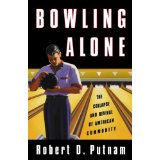
In his book, Bowling Alone, Robert T. Putnam, talks about the shifting American landscape and how our definition of community has changed so drastically over the past decades. In Bowling Alone, Putnam makes the comment that Americans traditionally have been communal people, bowling together, going to church together, serving in community clubs together. Yet in recent years, this has all shifted. The individuality of the American experience, enhanced by technology, travel and mobility, has increasingly made us disconnected from each other. Yet as I meet people in Madison, Wisconsin and other places, I see people longing for friendship, for a sense of connection to other like minded people and given to something bigger than themselves. When Jesus came to earth and lived, his ultimate purpose was not to help people improve their moral behavior so they could have improved relationships and get along better. Ultimately Jesus came and died to connect us to God and to each other i









